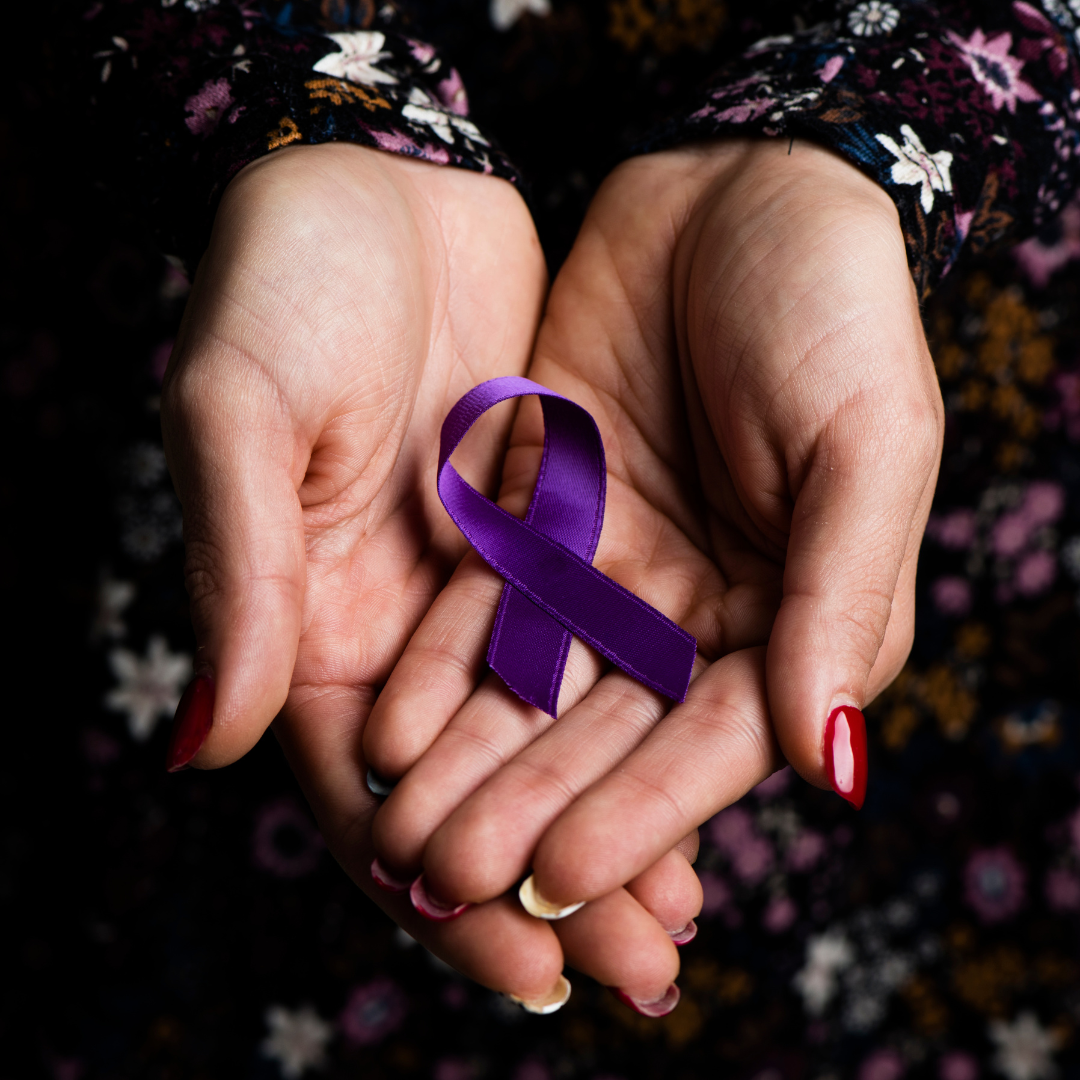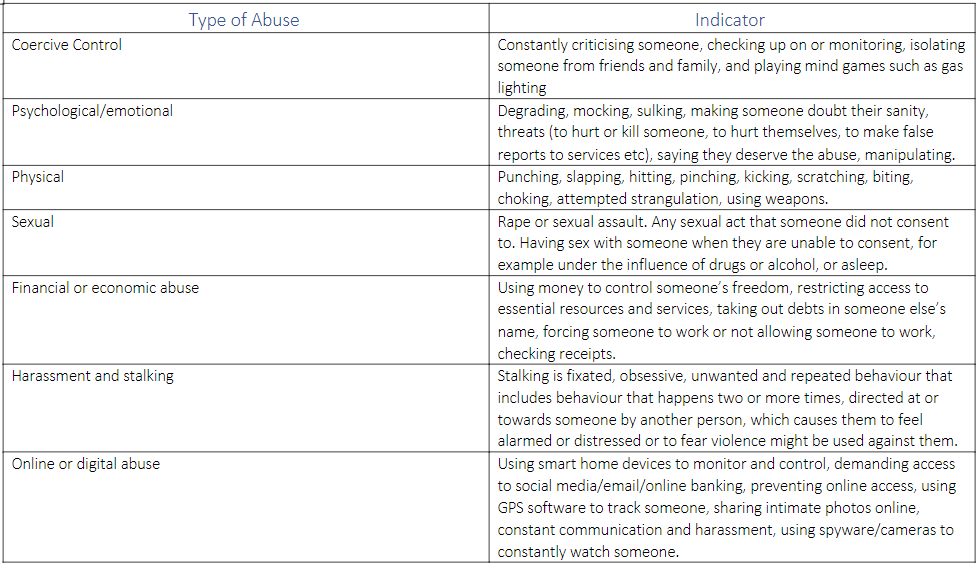
Domestic Abuse – Supporting Survivors
Resources on understanding domestic abuse and supporting survivors.
This guide is to give you some information about domestic abuse. You don’t need to be an expert in this, but by familiarising yourself with some of the key issues and warning signs, you could really make a difference to someone who needs support.
Remember, you will not be the person providing the support, there are specialist services who can do that, but by recognising when someone may need help and being able to validate their experiences and refer them to appropriate support, you are an important part of their story.
1. What is Domestic Abuse?
Domestic abuse can be described as an incident or pattern of incidents of controlling, coercive, threatening, degrading and violent behaviour, including sexual violence. Usually, the abuse is from a partner or ex-partner, but it can also be from a family member or carer.
Domestic abuse is very common but also a largely hidden crime so it can be difficult to know exactly how many people are affected. Victims often don’t report or disclose domestic abuse to the police. It is estimated that 1 in 5 adults experience domestic abuse during their lifetime.
Children are also victims of domestic abuse, either directly or indirectly through living in an unsafe and frightening environment. It is crucial that they are safeguarded and protected.
These figures are alarmingly high, and many people do not realise how common domestic abuse is. However, there is support and help available. If you are experiencing abuse yourself, or worried about someone who may be, you do not have to go through this alone.
The following video explains Domestic abuse, including coercive control. Controlling or coercive behaviour is now a criminal offence under the Serious Crime Act 2015.
There are various forms of domestic abuse. Some people may experience all or several of these, some may only experience one, but they should all be taken seriously. All of these behaviours make it very difficult for someone to leave the relationship.

So Called ‘Honour’-Based Abuse
So called ‘honour’-based abuse is a when a crime is committed to protect or defend the ‘honour’ of a family or community. This concept of ‘honour’ can be used to justify abuse. It is often thought of as a ‘cultural’, ‘traditional’ or ‘religious’ issue. However, cultural tradition does not mean honour-based abuse is acceptable or legal. ‘Honour’-based abuse is more prevalent within communities from South Asia, the Middle East, and North and East Africa.
Perpetrators are often partners, ex-partners, or family members. Victims are seven times more likely to experience abuse from multiple perpetrators and are at greater risk of serious harm or homicide.
Forced marriage and female genital mutilation (FGM) can be forms of ‘honour’-based abuse. Forced marriage is one in which one or both people do not or cannot consent to the marriage but are coerced into it by their families or community.
Forced marriage is illegal in the UK. Under the Forced Marriage Act 2007, you can apply to designated courts in England and Wales for a Forced Marriage Civil Protection Order. Or you can ask someone to do this on your behalf. These orders can be used to prevent someone from being forced into a marriage or to protect someone if a forced marriage has already taken place.
Female genital mutilation (FGM) is the partial to total removal of a girl’s external genitalia, or any other injury to the female genitalia for non-medical reasons and is illegal in the UK. FGM is child abuse and can impact a girl or woman’s physical and emotional health, both in the short and long term. It is a criminal offence to perform or assist in performing FGM in the UK, or to take a woman or girl abroad for the procedure. It is also illegal to help or pressure a girl to carry out FGM on herself, and to fail to protect a girl from risk of FGM. There are also laws about FGM taking place abroad.
Please click below to learn more about ‘honour’-based abuse, forced marriage, FGM, and specialist support services.
If you are worried about FGM you can contact the NSPCC FGM Helpline: 0800 028 3550 / [email protected]h
2. Warning Signs of Domestic Abuse
So, how can you tell that someone may be experiencing domestic abuse? Like with many things, there are various warning signs which may indicate abuse. The table in section 2 above lists some ways that a perpetrator may abuse a victim. You may observe or hear about some of these. You may also be aware of changes in someone’s behaviour. The list below is not exhaustive but may indicate that you need to get support for that person. Remember, they may not realise or want to admit that they are in an unsafe relationship. We are using the language of ‘partner’ but in some cases the perpetrator may be a family member.
- Does their partner always accompany them or try to speak for them?
- Do they seem stressed or anxious all the time?
- Are they constantly checking their phone or having to reply to messages all the time?
- Do they seem scared of their partner?
- Do they make excuses for injuries or wear clothes that do not seem appropriate for the season (maybe to cover bruises)?
- Have they changed what they wear?
- Has their behaviour changed i.e.: having lower self-esteem, constantly having to check in with their partner, no longer attending meetings/social activities?
- Not having access to money/social media accounts
Remember, the suspected perpetrator will often blame the victim and minimise/deny their behaviour. They can often appear very charming to people outside of the family.
Risk Factors
There are a few key things which can increase the risk of serious harm. These include:
- Recent separation / planned separation
- Pregnancy
- Escalation of abuse (frequency or severity)
- Threats to kill
- Use of objects / weapons
- Threats by perpetrator to commit suicide
- Stalking
- Sexual violence
3. Barrier to disclosure
Research by the Asylum Support Appeals Project (2018) found that ‘women of colour living in a white-majority society such as the UK, and who have only limited access to economic resources; may face more difficulties than white, economically independent women in claiming their rights to live free from violence and abuse. Organisations may, even unconsciously, put up barriers that prevent women perceived as being from ‘different cultures’ from accessing their services. Abuse may be excused or ignored because it is perpetrated within cultures seen as being ‘other’. To learn more click here.
Here are some of the common issues or concerns they may face:
- Not recognising the behaviour as abuse (particularly for women whose home countries do not have a legislative framework that recognises and seeks to prevent and punish ‘private’ forms of abuse)
- Financial dependency on spouses
- Lack of awareness of legal systems, rights and support services in the UK, or a mistrust in these services
- Shame and guilt especially around how they will be perceived by family or community
- English not being a first language
- Fear of being removed from the UK
- Insecure immigration status
- Fear and the impacts of trauma
- Worry about the safety of children or other family members living in other countries who may be threatened if they report abuse
- Uncertainty over safe accommodation
This guide on the impacts of trauma provides more detailed understanding of the trauma that refugees may experience.
4. How to ask about Domestic Abuse
It can feel really daunting to ask about something so personal and difficult. If you are having concerns about someone then there is usually a reason. Remember, there are trained professionals who can support victims. You can play an important role in recognising and validating their experiences and helping to keep them safe. It may be appropriate for someone of the same gender as the person you will be speaking to, to be the one to have this conversation.
1. Recognise
Firstly, it’s crucial to make sure that they are in alone and safe before speaking with them about abuse. If you are on the phone with them, you can ask closed questions to establish this, allowing them to give ‘yes’ or ‘no’ answers such as ‘are you alone?’. If they are not alone, especially if they are with the person you are worried may be hurting them, you could arrange to call back or meet them another time. You could make up a generic reason for this meeting so as not to alarm anyone.
You can start with a more general supportive conversation and ask things like “is anything wrong?” or say that you are worried about them and why and if they would like to talk about it. Remember that talking about this may be hard and can be a culturally sensitive issue, so they may be reluctant or say everything is fine. This should not end your concerns or involvement. If you believe something is not right, it is important to try to carry on these conversations as you build up trust and to refer your concerns to your safeguarding lead.
If someone is in immediate danger, call 999 and ask for the police. Silent calls will work if you are not safe to speak – use the Silent Solution system and call 999 and then press 55 when prompted.
‘Domestic abuse crosses the boundaries of race, culture, language and religious and ethnic background. It can happen to anyone. But, for a multitude of reasons, Black and minoritised women often face additional barriers to accessing support’ (Refuge)
2. Reassure
Make sure to listen carefully, tell them that you believe them, that this is not their fault,and that there is help available.
Explain what you will do next, who you will tell, and what will happen. Remember, they may be worried about involving outside organisations for fear of what they will do, what the abuser will do, what will happen to their family, etc so be ready to reassure them.
3. Respond
Do not ask probing questions and don’t attempt to provide advice yourself. Keep a verbatim record of what the person told you and contact your safeguarding lead to report your concerns and what you have been told. They will then make a decision about next steps which can include calling the police and/or referring to a local specialist agency. Make sure you have the details ready for the support in your local area. This can be found by searching online for ‘domestic abuse support’ and then the name of the area you live in. Local authorities usually have this information on their websites as well.
Take care of yourself. It can be distressing to hear other people’s accounts of abuse and trauma, especially if you have any personal experience of these issues yourself. Make sure you also get support.
The following video provides guidance on receiving a disclosure of abuse.
5. Support services
The support needed will depend on various factors. Remember, you will not be the person providing the support, there are specialist services who can do that, but by recognising when someone may need help and being able to validate their experiences and refer them to appropriate support, you are an important part of their story.
If someone is in immediate danger, call 999 and ask for the police. Silent calls will work if you are not safe to speak – use the Silent Solution system and call 999 and then press 55 when prompted.
If they are not in immediate danger:
- England: Freephone 24h National Domestic Abuse Helpline: 0808 2000 247
- LGBT+ Domestic Abuse Helpline: 0800 999 5428 https://galop.org.uk/
- Men’s Advice Line (for male domestic abuse victims): 0808 801 0327 [email protected]
- Karma Nirvana, UK Helpline for ‘honour’-based abuse and forced marriage: 0800 5999 247
- Victim Support National 24-hour Support line: 0808 1689 111
- Respect phoneline for perpetrators: Freephone 0808 8024040 https://respectphoneline.org.uk/
- For online support for domestic abuse victims go to https://chat.womensaid.org.uk/
6. Bespoke consultation sessions for groups
We are aware that receiving a disclosure of domestic abuse can be difficult and require more in-depth support. We now offer groups bespoke consultation sessions which they can access whenever a significant issue arises. Each consultation session is tailored specifically to the needs of the group and the family they support.
This may include:
- Advisory sessions
- Bespoke training and tools
- Planning next steps
- Reflective practice sessions
To discuss booking a session please email: [email protected]

